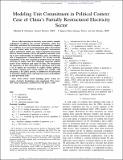Modeling Unit Commitment in Political Context: Case of China's Partially Restructured Electricity Sector
Author(s)
Davidson, Michael R. (Michael Roy); Perez-Arriaga, Jose Ignacio
DownloadDavidson_Pérez-Arriaga~Modeling Unit Commitment in Political Context-2018.pdf (616.4Kb)
Terms of use
Metadata
Show full item recordAbstract
Restructuring an electricity sector entails a complex realignment of political and economic institutions, which may both delay and distort the achievement of satisfactorily competitive conditions. In research and planning for policy interventions in power systems under these varied regulatory environments, typical operational models may neglect important interactions between techno-economic criteria and political constraints, leading to poor understanding of underlying causes of inefficiency and to inappropriate recommendations. We develop tractable formulations of the unit commitment problem based on integer clustering of similar units that endogenize important political factors in the Northeast grid region of China. We demonstrate the importance of these interactions on operations and provide a set of options for researchers to explore further pathways for China's ongoing power system reforms. For example, wind integration, a key policy priority, is inhibited by the interaction of institutions limiting short- and long-term sources of flexibilities in interprovincial trade.
Date issued
2018-09Department
Massachusetts Institute of Technology. Institute for Data, Systems, and Society; Sloan School of ManagementJournal
IEEE Transactions on Power Systems
Publisher
Institute of Electrical and Electronics Engineers (IEEE)
Citation
Davidson, Michael and J. Ignacio Perez-Arriaga. "Modeling Unit Commitment in Political Context: Case of China's Partially Restructured Electricity Sector." IEEE Transactions on Power Systems 33, 5 (September 2018): 4889 - 4901 © 2018 Institute of Electrical and Electronics Engineers (IEEE)
Version: Author's final manuscript
ISSN
0885-8950
1558-0679